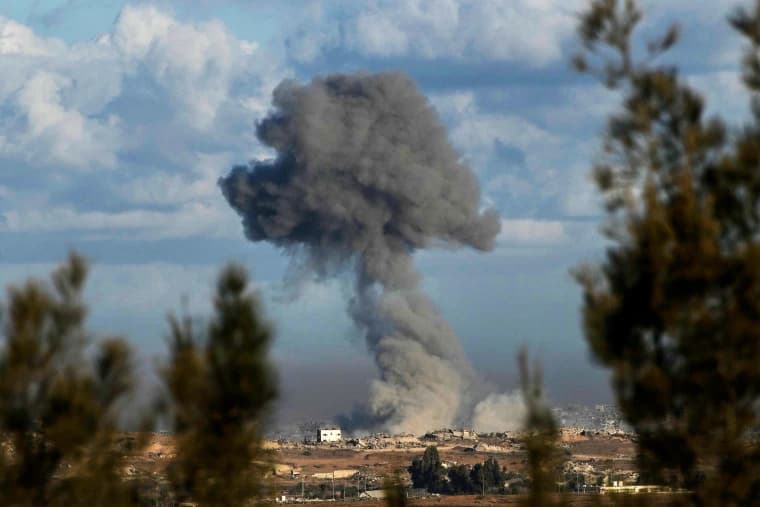We're loading the full news article for you. This includes the article content, images, author information, and related articles.
US Special Envoy Steve Witkoff and Jared Kushner have arrived in Egypt to join ongoing indirect peace negotiations between Israeli and Hamas delegations, aiming to secure a ceasefire and hostage release two years after the conflict began.

US Special Envoy Steve Witkoff and Jared Kushner, son-in-law to US President Donald Trump, arrived in Egypt on Wednesday, October 8, 2025, to participate in high-stakes indirect peace talks between Israeli and Hamas negotiators. Their arrival signals a reinforced American push to mediate an end to the protracted conflict in Gaza, which began two years ago with the October 7 Hamas attacks on Israel.
The talks, hosted in the Red Sea resort city of Sharm el-Sheikh, are centered on a 20-point peace plan proposed by President Trump last week. While the plan has received broad international backing, including from Arab and Islamic nations, significant details remain under negotiation.
Discussions on Tuesday, October 7, 2025, the second anniversary of the initial Hamas attacks, concluded without concrete results, according to a senior Palestinian official. However, President Trump expressed optimism on Tuesday, stating there is a "possibility that we could have peace in the Middle East."
The current negotiations represent a renewed effort to halt the conflict that erupted on October 7, 2023, when Hamas-led militants launched a surprise attack on Israel, killing approximately 1,200 people, mostly civilians, and taking 251 hostages. Israel's retaliatory offensive in Gaza has since resulted in the deaths of over 67,000 people, predominantly civilians, and injured more than 170,000, according to the health ministry in the Hamas-run territory.
Previous ceasefire attempts in November 2023 and January 2025 both collapsed, highlighting the deep-seated complexities of the conflict. The involvement of high-profile US envoys like Witkoff and Kushner underscores the Trump administration's commitment to securing a deal.
The Trump administration's 20-point plan outlines a phased approach to ending the war. Key elements include a ceasefire, the release of all remaining hostages held by Hamas, the disarmament of the militant group, and a gradual withdrawal of Israeli forces from Gaza. The plan also envisions an international security force in Gaza and the territory being placed under a technocratic committee and international governance.
Hamas has expressed readiness to reach a deal but has set conditions, including the immediate and complete withdrawal of Israeli forces and guarantees that the war will not resume. Israel's Prime Minister Benjamin Netanyahu has maintained that the war will only end with the return of all hostages and the disarmament of Hamas.
The negotiating teams include senior Hamas official Khalil al-Hayya and representatives from Israel. Mediators from Qatar and Egypt have been facilitating the indirect talks. White House spokesperson Karoline Leavitt emphasized the urgency, stating it is important "that we get this done quickly."
The conflict has led to a severe humanitarian crisis in Gaza, with the United Nations reporting a unfolding famine and over two million Palestinians facing hunger. The plan includes provisions for a surge in humanitarian aid to Gaza.
Despite the cautious optimism, significant obstacles remain. Hamas's demand for a complete Israeli withdrawal and guarantees against renewed conflict, coupled with Israel's insistence on disarming Hamas, present major sticking points. The involvement of Jared Kushner, who has previously faced criticism for his stance on Palestinian issues, could also raise concerns among some Palestinian factions.
For Kenya, the broader stability of the Middle East has economic and security implications. While Kenya maintains diplomatic relations with both Israel and Palestine and supports a two-state solution, its foreign policy has historically leaned towards the West and, by extension, Israel. President William Ruto has condemned the initial Hamas attacks while also calling for de-escalation and a two-state solution.
Uncertainties persist regarding the specific mechanisms for Hamas's disarmament and the extent of Israel's withdrawal. The exact composition and mandate of the proposed international security force in Gaza are also unclear. The timeline for implementing the various phases of the peace plan remains a critical unknown.
Indirect talks began on Monday, October 6, 2025, in Sharm el-Sheikh. The arrival of US envoys on Wednesday, October 8, 2025, is expected to intensify the mediation efforts. President Trump has reportedly instructed his envoys not to leave Egypt without a deal, suggesting a push for a swift resolution.
Observers will be closely watching for any breakthroughs on the core issues of a lasting ceasefire, the release of all hostages, and the future governance and security arrangements for Gaza. The reactions of various regional and international actors to any proposed agreement will also be crucial. The role of Qatar and Turkey, whose representatives are also joining the talks, will be significant in shaping the outcome.
Keep the conversation in one place—threads here stay linked to the story and in the forums.
Sign in to start a discussion
Start a conversation about this story and keep it linked here.
Other hot threads
E-sports and Gaming Community in Kenya
Active 9 months ago
The Role of Technology in Modern Agriculture (AgriTech)
Active 9 months ago
Popular Recreational Activities Across Counties
Active 9 months ago
Investing in Youth Sports Development Programs
Active 9 months ago